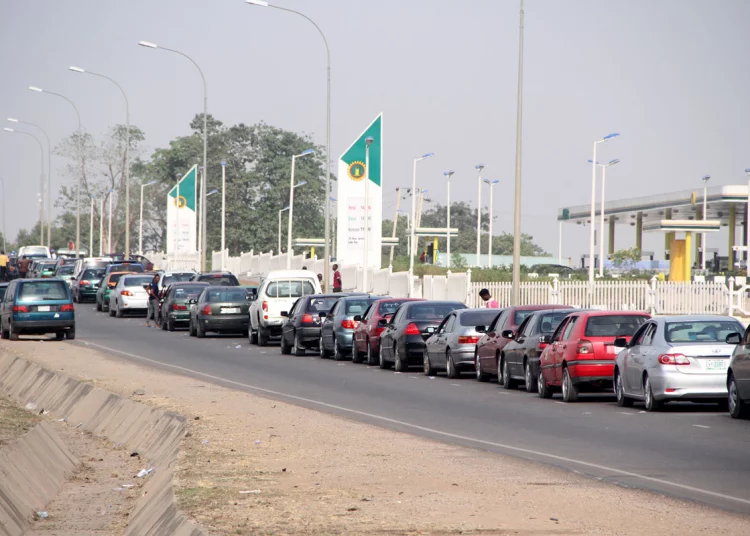The lingering fuel scarcity in Nigeria has worsened with petroleum marketers being blamed for exacerbating the crisis through profiteering and sharp practices.
Nigeria is facing its third major fuel scarcity in 2024, as the Nigerian National Petroleum Company Limited (NNPC) once again blamed “distribution challenges” as the root cause of the crisis.
The scarcity began in early July, leaving motorists and businesses grappling with long queues and inflated prices at filling stations nationwide.
Many petrol stations nationwide are shut or have long queues as most independent marketers’ petrol stations need more supply.
This is because marketers blamed the lengthy queues at petrol stations in Lagos for the NNPC’s rationing of products.
This situation has exacerbated traffic in the Lagos metropolis. Since this week, vehicle movement has been restricted on most major roads as the problem has become more clumsy.
Speaking on petrol scarcity, NNPC executive vice president, Downstream, Dapo Segun, attributed it to a distribution challenge occasioned by rains and thunderstorms that have endangered the loading of the product.
Segun, who commented during the NNPC’s presentation of its 2023 Audited Financial Statement (AFS) in Abuja on Monday, also said the roads are part of the distribution challenges hindering the product supply.
Segun said, “We have also had issues with the road network, which also makes bringing the product to the country challenging.
“The terminal in Lagos was built to address a very short supply gap. Vessels are in Lagos now, discharging as I speak. “A number of these combined to create a nightmare situation for us, but I can assure you we are doing everything to ensure we get petroleum products to the nooks and crannies of the country.”
LEADERSHIP, who spoke to some operators, deduced from their explanations that the hunger protests caused the situation, which forced tanker drivers to suspend operations.
One of our sources revealed that during the protest, the National Association of Road Transport Owners (NARTO), the Nigeria Union of Petroleum and Natural Gas Workers (NUPENG) and Petroleum Tanker Drivers (PTD) issued internal memos directing the suspension of operations.
He said that during that period, demand dropped significantly because of restricted vehicular movement. Still, demand spiked as soon as the protest subsided, and stabilising supply would take a little longer.
Also reacting to the situation while speaking to LEADERSHIP, Ibrahim Yahaya, general secretary of the Petroleum Dealers Association of Nigeria (PEDAN), said marketers’ agitation for pump price review could be part of the problem.
Yahaya said players and marketers have been engaging authorities to fully understand the subsidy removal and foreign exchange issues preventing them from importing.
According to him, since their demands have yet to be met, some may have devised other methods to take products where they can make more profits.
He said that a litre of petrol sells about N900 in Kano and above N800 in Abuja, but since this price cannot be justified in places like Lagos, it is possible to say marketers prefer moving outward to Lagos.
Yahaya said the issue of perceived scarcity. it is far from that.
“As far as I know, products are available, but again, the disruption could be attributed to the dearth of infrastructure, but petrol is available,” he said.
Meanwhile, expectations are high that the current situation will abate as soon as the Dangote refinery begins refining petrol this August.
Our Correspondent reports that the Nigeria Upstream Petroleum Regulatory Commission (NUPRC) said about eight Nigerian refineries, including the Dangote mega refinery, would begin refining Premium Motor Spirit (PMS), or petrol, in August 2024.
The refineries’ combined capacity is estimated at 864,500 barrels per day, significantly demanding the NUPRC for crude oil.
The regulator said that some refineries, including the Port Harcourt refinery, Waltersmith Refinery, the Dangote Refinery, and others, have raised their domestic crude requirements for the second half of 2024 to 597,700 barrels per day bpd from 483,000 bpd in the first half despite tight domestic supply.
In a statement released on Friday, the NUPRC said it could only help secure 177,777 bpd from oil producers in the first six months of the year, which is way below what the refiners had asked for.
The refineries’ rising crude requirements and oil producers’ struggle to meet demand have created misunderstandings between Dangote Refinery and the regulator.
An industry expert with knowledge of refinery operations told our Correspondent that the RFCCU is an advanced version of the Fluid Catalytic Cracking Unit(FCCU).
He said this is causing delays in the refinery’s efforts to commence petrol refining, another source within the refinery.





